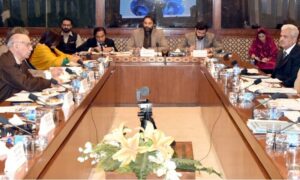With the threat of a new trade war hovering over its head, the world is trying to figure out how to deal with President Donald Trump’s second presidency.
The day after he was sworn in as the 47th president of the US, a panel of experts at the World Economic Forum (WEF) in Davos were discussing “how the global reception to his second presidency ran the gamut from excitement to fear”. Whether afraid or excited at the prospect of a second Trump term, they contended, people should be aware that it represents a significant change in the global post-war economic order.
One panellist used the term “vibe shift” to describe President Trump’s inauguration day. Something new and strange is happening, another said. The fact that Donald Trump has staged “the greatest comeback in [the US] political history” means the new president “thinks he can do anything”, he said.
Trump’s appearance on the forum confirmed those fears as he told world business leaders to “manufacture in the United States or face tariffs”. “Come make your products in America and we will give you among the lowest taxes of any nation on earth. But if you don’t make your product in America, which is your prerogative, then you will have to pay a tariff,” he stated as he spoke at WEF remotely.
Pakistan will likely have to walk a tightrope, balancing its relations with Washington and Beijing as the US begins its tariff journey
As he warned the business leaders that they would face tariffs if they made their products anywhere but the US, he also demanded that Saudi Arabia and Organisation of Petroleum Exporting Countries lower oil prices and the world drop interest rates. The message conveyed to the world was unmistakable: his second term will shun free market norms and multilateralism.
Tariffs have always been a key part of Trump’s economic agenda, with the Republican vowing wide-ranging duties on allies and adversaries alike while he was on the campaign trail. He has repeatedly pledged to overhaul the US trade system, promising to impose tariffs on Washington’s major trading partners Canada, Mexico, China and the European Union (EU) for running trade surpluses with the US.
After taking oath of his office, he told the audience: “I will immediately begin the overhaul of our trade system to protect American workers and families. Instead of taxing our citizens to enrich other countries, we will tariff and tax foreign countries to enrich our citizens.”
Since his inauguration, he has also signed a flurry of executive orders, upending the US government policies on diversity, climate change and immigration, as well as pulling the plug on the Paris Climate Accords and the World Health Organisation. He says he will rename the Gulf of Mexico as the Gulf of America, threatening to take back the Panama Canal from Panama, acquire Greenland, if necessary by military force, and turn Canada into the 51st state of the US by economic force.
It wouldn’t be a stretch to say that Trump haunted Davos most days, with US trade partners reacting to the upcoming second round of his America First policies even before his remote appearance at the forum. His second coming is already proving to be destabilising for the world.
His statements have elicited prompt response, with France and Germany shooting back to warn the US not to meddle with Europe’s borders while Danish leaders said Greenland was not for sale. The Mexican president responded to Trump’s remarks by saying parts of the US should instead be named Mexican America. Canada’s former prime minister Justin Trudeau posted on social media platform X that “there was a snowball’s chance in hell” of his country becoming part of the US.
Trump will intensify US domestic and foreign policy risks to international business in 2025 as he intends to use his second term to disrupt and reshape world order, positioning the US for more direct and aggressive confrontation with its economic and geopolitical adversaries, says the London-based risk consultancy firm, Control Risks.
“The year will establish national security as the guiding principle of international trade and investment. While global trade is forecast to grow in 2025, globalisation remains under threat as geopolitical competition drives the fragmentation of financial systems and supply chains, while complicating technology choices,” it said. It added that three factors will fuel global trade tension and increase the risk of a global trade war in 2025: China’s manufacturing power, US trade policy, and global industrial policy.
The new US president even listed India — a key US ally in South Asia — as one of the countries with high tariffs on US products and has indicated that he favoured reciprocating them.
A report from Bloomberg said that India is evaluating its choices to counter Trump’s tariff threats to foes and allies alike, which range from presenting a trade deal, cutting tariffs and importing more goods from the US. It stated that the Modi-led government had mapped out several scenarios to counter steps the new US administration “may take to narrow India’s trade surplus of $35.3 billion with the US”.
Among the options discussed, the government could buy more whiskey, steel and oil from the US,“ Bloomberg said, adding that the officials also discussed decreasing import tariffs, with the list of likely products including “bourbon whiskey and farm goods like pecan nuts”.
“The plans under discussion are part of India’s larger strategy to avoid any confrontation with Trump, and also benefit from any potential US-China trade war,” the report elaborated, adding that the plans had not been finalised. India is also considering “a limited trade deal” with the US, which the Modi administration tried to implement during Trump’s first term.
World Trade Organisation Chief Ngozi Okonjo-Iweala called on cooler heads to prevail during a WEF panel discussion on tariffs, warning that tit-for-tat levies would be “catastrophic” for the world economy.
Espen Barth Eide, Minister of Foreign Affairs for Norway, told Reuters: “It’s not particularly strange that you want to foster growth in your own country. But of course, we believe that we are better off in the world of free trade, where we exchange goods and services openly.”
Chinese Vice Premier Ding Xuexiang warned: “Protectionism leads nowhere and there are no winners in a trade war”, saying his country was looking for a “win-win” solution to trade tensions and wanted to expand its imports.
European Commission President Ursula von der Leyen took a conciliatory tone and said Brussels was ready to negotiate with Trump as she underscored the EU’s diverging policy with him on climate and pledged to stick to the Paris Climate Accord. The EU’s “first priority will be to engage early, discuss common interests and be ready to negotiate” with Trump. “We will be pragmatic but we will always stand by our principles, to protect our interests and uphold our values,” she said.
Like others, Pakistan too is betting its hopes on greater engagement with the US but, as political observers have pointed out recently, Trump’s foreign policy towards Islamabad would likely be dictated by its competition with China.
Earlier this month, a senior White House official had underscored the complex nature of US-Pakistan relations based on shared security concerns and divergent strategic priorities, saying that “Pakistan has played a pivotal role in US counterterrorism efforts over the years, but it has never been a formal ally bound by treaty obligations.”
If Trump’s election campaign is any guide, Washington’s Pakistan policy will be guided by its strategy against China in the region to curtail Beijing’s dominance in various strategic sectors. India’s pivotal role as the key US ally in this effort would have repercussions for the US engagement with Pakistan. Islamabad is likely to face pressure to rely less on Chinese investment by means of the multi-billion-dollar China-Pakistan Economic Corridor. In other words, Pakistan would likely have to walk a tightrope, balancing its relations with both Washington and Beijing.
Published in Dawn, The Business and Finance Weekly, January 27th, 2025
- Desk Reporthttps://foresightmags.com/author/admin/











